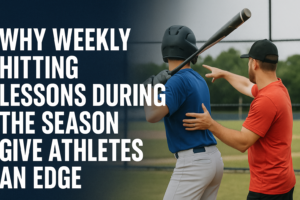Why Weekly Hitting Lessons During the Season Give Athletes an Edge
 For many baseball and softball families, the season can feel overwhelming — games, practices, tournaments, and travel often leave little time for anything else. Because of this, some parents assume that private lessons should be reserved for the offseason. But the truth is, weekly hitting lessons during the season can make the biggest difference in an athlete’s development and performance.
For many baseball and softball families, the season can feel overwhelming — games, practices, tournaments, and travel often leave little time for anything else. Because of this, some parents assume that private lessons should be reserved for the offseason. But the truth is, weekly hitting lessons during the season can make the biggest difference in an athlete’s development and performance.
Here’s why consistent instruction matters — and how it separates athletes who grow from those who plateau.
The Advantage of Consistency
Athletes who take weekly hitting lessons:
-
Build muscle memory with consistent reps guided by a professional.
-
Stay accountable with small adjustments week after week.
-
Get real-time feedback that prevents bad habits from creeping in.
-
See measurable results at the plate because lessons align with live game experiences.
Athletes who skip lessons during the season:
-
Often rely only on team practices, which rarely focus on individual mechanics.
-
Let bad habits develop unchecked, leading to slumps and frustration.
-
Struggle to connect what they’re doing in games with what needs improvement.
-
Plateau because they lack consistent, personalized guidance.
Consistency doesn’t just build better swings — it builds better hitters.
Turning Game Struggles Into Progress
One of the greatest benefits of weekly hitting lessons is the ability to take game experiences and immediately break them down with a professional instructor.
-
Example: A hitter notices they’re rolling over ground balls during the weekend. By Monday, they’re working with their instructor to correct bat path and hand position.
-
Result: Instead of letting the problem continue for weeks, the hitter makes the correction within days — and brings confidence back to the next game.
This cycle of play, evaluate, adjust is what accelerates growth. Without lessons, athletes often go weeks or months struggling with the same issues.
Faster Corrections = Faster Results
Game performance is the best feedback tool, but only if athletes know how to use it. Professional instructors help young hitters:
-
Identify what went wrong in a specific at-bat.
-
Explain why a certain mechanical adjustment will fix it.
-
Reinforce the correction with drills and repetitions.
This means athletes don’t just play more games — they learn from every game. Over the course of a season, those incremental adjustments lead to big improvements.
Confidence at the Plate
Perhaps the most underrated benefit of weekly lessons is confidence.
-
Hitters know they have a trusted instructor to turn to when things feel off.
-
Parents know their child is not “guessing” their way through a slump.
-
Athletes walk to the plate believing in their swing because they’ve tested and trained it under guidance.
Confidence alone can be the difference between a hesitant swing and a hard-hit ball.
The Bottom Line for Parents
Weekly hitting lessons during the season are not an “extra.” They’re an investment in keeping your athlete:
-
On track with proper mechanics.
-
Accountable for consistent reps.
-
Confident with every at-bat.
-
Prepared to turn game struggles into development opportunities.
The athletes who grow the most are the ones who combine team practices, game reps, and consistent private instruction.
At R3 Athlete Performance, our hitting instructors work with baseball and softball players throughout the season, helping them use every rep to get better — both in training and in competition.
👉 Parents: Don’t wait until the offseason to fix issues. Give your athlete the benefit of weekly hitting lessons now — so every game becomes a chance to improve.
